15 November, 2003
While here at Big Razorback I have been doing an
extensive scientific study of my own. I have
been observing and evaluating the foraging
behavior of seal researchers. It has been an
interesting and tasty study in which to
parcticipate. My findings have led me to support
changing the name of our camp from Big Razorback
to Big Grazerback, in recognition of the eating
style that has developed over the past few weeks.
It all began with our trip to the Food Room many
weeks ago. We picked up a tasty assortment of
canned, dried, and frozen foods on which to base
our daily menu. Unlike the Galley (McMurdo's
cafeteria) we do not plan the week's menus in
advance. Instead, we rely on individual
creativity and hunger-fueled inspiration to come
up with each night's meals. Often, the hungriest
person is the one who volunteers to cook dinner,
so that full satisfaction is guaranteed.
Well, what do we eat out here at Big Grazerback?
Breakfasts are a simple grazing affair, with each
eating according to their own individual tastes.
Most mornings we eat cold cereal with freshly
reconstituted powdered milk. There are some
choices in cereal-granola, raisin bran, shredded
wheat, and tasteeos (better dubbed tastelessos,
from their blandness). We also have some hot
cereal around-7 Grain, instant oatmeal, and
instant grits. Some of us are more partial to
toast, nicely browned using our stovetop toaster
that fits over the burner of the propane
cookstove. But what kind of toast? Well, there
are English muffins or bagels and the occasional
loaf of fresh bread from McMurdo's Galley crew.
And what to put on the toast? So many
choices-butter or peanut butter, honey or jam (2
flavors)-how to decide? The camp is split on the
hot beverage question; there are four coffee
drinkers, one tea drinker, and one who rarely
drinks hot beverages.
While we're happily grazing away on our
breakfasts we are also getting the lunchbags
ready. Each group carries a daypack loaded with
a perfect picnic for the ice. Our picnic
supplies include a large thermos of hot water and
2 insulated cups. There's an assortment of
instant soups and hot beverages, as well as the
essential bag of chocolate bars and granola bars.
We also try to add a few sticks of beef jerky to
satisfy the carnivores of the group, but have
found they make better soup-stirrers than
luncheon edibles. Most of us also carry our
personal stash of chocolate because you never
know when you might need some quick energy or
just an attitude adjustment. We also carry along
cheese or salami to supplement the hot soup.
Lunch is a casual affair-it's whenever you have
time and wherever you might be. One thing's for
sure-our cafeteria has some of the best views in
the world!
The grazing begins in earnest when we all return
to camp. While various menu ideas are floated
about, someone usually manages to find something
on which to graze-Pringles, crackers, leftovers,
or any other edible item that rise to the
surface. Should we fry, bake, or grill? What
spices should we use? How about cooking up just
a few of the 25 boxes of Pasta-Roni that we
somehow brought out here? The perennial
favorites so far have been macaroni and cheese
with tuna and peas, bean burritos and quesadillas
(with their myriad variations), stir-fry
vegetables with tofu, rice and spicy peanut
sauce, and anything that gets cooked on the
grill. When it comes to desserts it's easy as
long as there's some Oreos around. I continue to
be amazed at the group's capacity for Oreo
consumption. Whoever decided that a serving size
was only 3 Oreos grossly underestimated the
Oreo-eating capabilities of this group of
researchers! Sometimes for variety we'll whip up
a little basked treat, like brownies or
gingerbread, or mix up one of those instant
cheesecakes, since it's easy to chill the filling
outside.
Looking over our groaning larder, I can't help
but think of Robert Falcon Scott and his men
during their attempt to reach the South Pole.
Their daily ration for the polar trek was
carefully calculated to provide optimum amounts
of fat, carbohydrates, and proteins, although
they were not exactly sure what the absolute
quantities of each would be. The ration of 34.43
ounces each day per person included 16 ounces of
biscuits, 12 ounces of pemmican, 2 ounces of
butter, 0.57 ounces of cocoa, 3 ounces of sugar,
and 0.86 ounces of tea. This was calculated to
provide 4889 calories. According to Apsley
Cherry-Garrard, a member of Scott's crew who was
not a part of the final bid for the Pole, this
was not enough calories to compensate for days
spent man-hauling sleds across the snowy surface
and nights spent shivering in frost-soaked
sleeping bags at cold temperatures. It was
certainly not enough calories to provide them
with any sort of caloric 'safety net' that would
have helped them survive their final tent-bound
days waiting out a storm.
Conditions have certainly changed since Scott's
expedition, at least for camp-based researchers
such as ours. Our lives are much easier and our
food choices incredibly varied in comparison. We
sleep in heated huts with a well-stocked pantry
and travel across the ice by burning fossil fuel
instead of our own calories. I'm still not sure
if our daily calorie consumption would carry us
to the Pole under our own power, but I am sure
that our diet is incredibly varied and quite
amazing when you take a moment to just look out
and see where we are.
HmmmmŠI wonder what we'll eat for dinner tonight?
Daily Haiku:
Cereal breakfast
Soup and chocolate for lunch
What is for dinner?
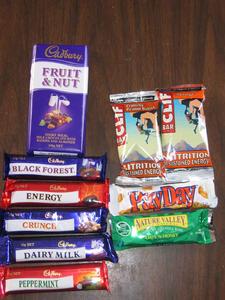
These are the choices for your daily candy ration. The food room allows us 2 chocolate bars per day.
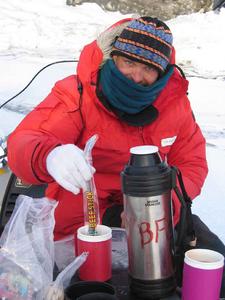
The beefsticks are best used to stir your soup.
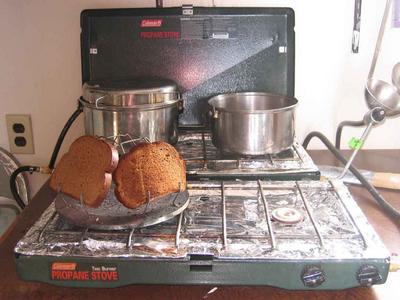
Bread browning nicely on our stovetop toaster.
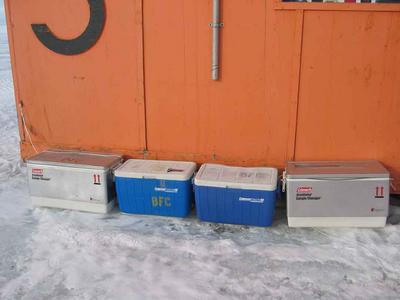
We store our frozen food outside in these coolers. It's sort of like the world's largest walk-in freezer.
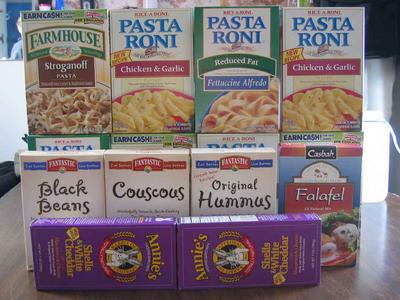
We have quite an assortment of dried foods from which to choose, but I think we're a bit overloaded when it comes to Pasta-Roni.
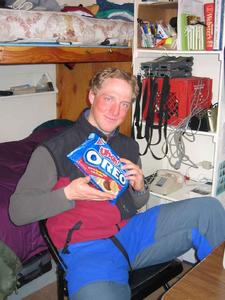
Don't forget the Oreos for dessert!
Contact the TEA in the field at
.
If you cannot connect through your browser, copy the
TEA's e-mail address in the "To:" line of
your favorite e-mail package.
|
